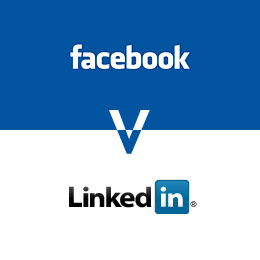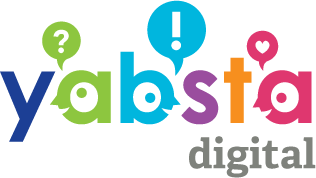
Posted on: December 17, 2013
Posted by: Charles Doyle
Categories:
Development
Though similar in terms of global popularity and relative ease of use, Facebook and LinkedIn are quite different in messaging and functionality. To business owners unfamiliar with social media, it can be understandably confusing to decide which medium is right for you (if not both) and how each of them functions to drive engagement with your brand. The general stock answer when someone is asked the difference between the two is as follows: “LinkedIn is like Facebook, but for business”. While there is technically some truth to this depending on interpretation, its a woefully vague and misleading definition: The respective marketing values of these platforms are most visible at a micro level through experimentation with each. Here are some fundamental differences:
“Fans” Vs. “Followers”
 When you set up a business page on Facebook, people who engage with your company become “fans” by “liking” your page (literally clicking a button that says “like”). On LinkedIn, people who engage with your company are called “followers” (by means of, you guessed it, clicking on a button that says “follow”). Though the relationships between these two platforms and their users share certain fundamentals, the respective end goals of said relationships differ in terms of messaging: Facebook encourages a casual tone of speaking while LinkedIn promotes a more conservative, business-like tone. This isn’t to say that LinkedIn is devoid of fun or atmosphere, but it’s very nature as one of the only professional social networks tends to encourage a higher level of tact in messaging than you’d expect to see on the average Facebook page.
When you set up a business page on Facebook, people who engage with your company become “fans” by “liking” your page (literally clicking a button that says “like”). On LinkedIn, people who engage with your company are called “followers” (by means of, you guessed it, clicking on a button that says “follow”). Though the relationships between these two platforms and their users share certain fundamentals, the respective end goals of said relationships differ in terms of messaging: Facebook encourages a casual tone of speaking while LinkedIn promotes a more conservative, business-like tone. This isn’t to say that LinkedIn is devoid of fun or atmosphere, but it’s very nature as one of the only professional social networks tends to encourage a higher level of tact in messaging than you’d expect to see on the average Facebook page.
Favorite Things Vs. Skills & Expertise
Here’s where the “fun vs. business” comparison is particularly apt: While Facebook encourages you to enter your favorite music, films, television shows and hobbies as a means of building up your profile, LinkedIn asks you to do the same, but with your business skills and expertise. Facebook’s database features a trove of cultural artefacts for you to associate yourself with (eg. you can “like” the profile page of your favorite movie to let people know that you enjoy it), whereas LinkedIn has a list of thousands of business skills across all fields that you can associate yourself with. The biggest difference in execution between Facebook and LinkedIn in this respect is that with the latter, your skill endorsements must come from other people as opposed to yourself. This quality control makes sense: If they allowed anyone to endorse themselves for any skill, people could easily just lie and build a misleading resume.
Recruitment
Perhaps the starkest difference between the two platforms is that LinkedIn features built-in job recruitment functionality for both employers and job-seekers. Facebook does not. With this functionality, LinkedIn has slowly become one of the most reliable recruitment resources available on the web due to the quality control offered by its secure member profiles. You don’t have to worry about spammers, fake job posting or the like, and as a job seeker, can browse available jobs in your geographic area at no cost. While recruiters do have to pay a fee for posting an ad, its worth it considering that you’re far more likely to reach the specific pool of candidates you were targeting.
Though similar in terms of global popularity and relative ease of use, Facebook and LinkedIn are quite different in messaging and functionality. To business owners unfamiliar with social media, it can be understandably confusing to decide which medium is right for you (if not both) and how each of them functions to drive engagement with your brand. The general stock answer when someone is asked the difference between the two is as follows: “LinkedIn is like Facebook, but for business”. While there is technically some truth to this depending on interpretation, its a woefully vague and misleading definition: The respective marketing values of these platforms are most visible at a micro level through experimentation with each. Here are some fundamental differences:
“Fans” Vs. “Followers”
 When you set up a business page on Facebook, people who engage with your company become “fans” by “liking” your page (literally clicking a button that says “like”). On LinkedIn, people who engage with your company are called “followers” (by means of, you guessed it, clicking on a button that says “follow”). Though the relationships between these two platforms and their users share certain fundamentals, the respective end goals of said relationships differ in terms of messaging: Facebook encourages a casual tone of speaking while LinkedIn promotes a more conservative, business-like tone. This isn’t to say that LinkedIn is devoid of fun or atmosphere, but it’s very nature as one of the only professional social networks tends to encourage a higher level of tact in messaging than you’d expect to see on the average Facebook page.
When you set up a business page on Facebook, people who engage with your company become “fans” by “liking” your page (literally clicking a button that says “like”). On LinkedIn, people who engage with your company are called “followers” (by means of, you guessed it, clicking on a button that says “follow”). Though the relationships between these two platforms and their users share certain fundamentals, the respective end goals of said relationships differ in terms of messaging: Facebook encourages a casual tone of speaking while LinkedIn promotes a more conservative, business-like tone. This isn’t to say that LinkedIn is devoid of fun or atmosphere, but it’s very nature as one of the only professional social networks tends to encourage a higher level of tact in messaging than you’d expect to see on the average Facebook page.
Favorite Things Vs. Skills & Expertise
Here’s where the “fun vs. business” comparison is particularly apt: While Facebook encourages you to enter your favorite music, films, television shows and hobbies as a means of building up your profile, LinkedIn asks you to do the same, but with your business skills and expertise. Facebook’s database features a trove of cultural artefacts for you to associate yourself with (eg. you can “like” the profile page of your favorite movie to let people know that you enjoy it), whereas LinkedIn has a list of thousands of business skills across all fields that you can associate yourself with. The biggest difference in execution between Facebook and LinkedIn in this respect is that with the latter, your skill endorsements must come from other people as opposed to yourself. This quality control makes sense: If they allowed anyone to endorse themselves for any skill, people could easily just lie and build a misleading resume.
Recruitment
Perhaps the starkest difference between the two platforms is that LinkedIn features built-in job recruitment functionality for both employers and job-seekers. Facebook does not. With this functionality, LinkedIn has slowly become one of the most reliable recruitment resources available on the web due to the quality control offered by its secure member profiles. You don’t have to worry about spammers, fake job posting or the like, and as a job seeker, can browse available jobs in your geographic area at no cost. While recruiters do have to pay a fee for posting an ad, its worth it considering that you’re far more likely to reach the specific pool of candidates you were targeting.
 When you set up a business page on Facebook, people who engage with your company become “fans” by “liking” your page (literally clicking a button that says “like”). On LinkedIn, people who engage with your company are called “followers” (by means of, you guessed it, clicking on a button that says “follow”). Though the relationships between these two platforms and their users share certain fundamentals, the respective end goals of said relationships differ in terms of messaging: Facebook encourages a casual tone of speaking while LinkedIn promotes a more conservative, business-like tone. This isn’t to say that LinkedIn is devoid of fun or atmosphere, but it’s very nature as one of the only professional social networks tends to encourage a higher level of tact in messaging than you’d expect to see on the average Facebook page.
When you set up a business page on Facebook, people who engage with your company become “fans” by “liking” your page (literally clicking a button that says “like”). On LinkedIn, people who engage with your company are called “followers” (by means of, you guessed it, clicking on a button that says “follow”). Though the relationships between these two platforms and their users share certain fundamentals, the respective end goals of said relationships differ in terms of messaging: Facebook encourages a casual tone of speaking while LinkedIn promotes a more conservative, business-like tone. This isn’t to say that LinkedIn is devoid of fun or atmosphere, but it’s very nature as one of the only professional social networks tends to encourage a higher level of tact in messaging than you’d expect to see on the average Facebook page.




Thanks for this! It was very concise. I’d love to read about an effective strategy for businesses using both of these platforms in tandem.